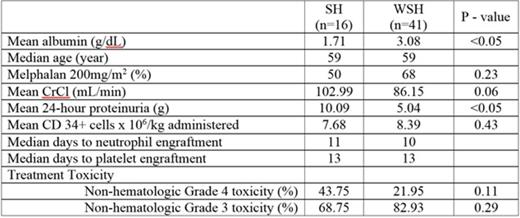Abstract
Background:
High-dose melphalan with autologous peripheral blood stem cell transplantation (HDM/SCT) has been shown to extend survival as well as to induce hematologic and clinical responses in selected patients with light chain (AL) amyloidosis. The most frequent toxicities of HDM are profound myelosuppression and gastrointestinal (GI) side effects. Studies have shown that 80% of melphalan is bound to plasma proteins (60% albumin bound) with ~20% free. We hypothesized that AL amyloidosis patients with severe nephrotic syndrome and profound hypoalbuminemia might have greater free melphalan fraction and more treatment-related toxicity.
Methods:
Patients with AL amyloidosis treated with HDM/SCT between 2011 and 2014 with severe hypoalbuminemia (SH), defined as a pre-transplant serum albumin of ≤2g/dL, were studied retrospectively. The stem cell transplant database was queried for patient demographic information, pre-transplant albumin level, HDM dose, renal function, pre-transplant 24-hour urine protein level, time to neutrophil and platelet engraftment, and treatment-related complications. Patients with AL amyloidosis treated between 2011 and 2012 without severe hypoalbuminemia, defined as serum albumin level of > 2g/dL (WSH), served as a control group.
Results:
Of the 84 patients with AL amyloidosis treated with HDM/SCT in this 4 year period, 16 (19%) with SH were identified. 41 patients were identified in the control group (WSH). There was no difference in the proportion of patients with all non-hematologic grade 3 or 4 adverse events between the groups. All patients suffered from expected grade 4 myelosuppression. The only statistically different non-hematologic grade 4 toxicity in SH was acute renal failure requiring temporary hemodialysis (n=4/16, 25% SH vs n=2/41, 5% WSH; p=0.05), with 1 subject eventually needing long term dialysis. There were no grade 4 mucositis or GI toxicities in either groups. The only statistically different grade 3 non-hematologic toxicity was lightheadedness (n=3/16, 19% SH vs n=0/41, 0% WSH; p=0.02).
Conclusion:
These data suggest that patients with severe hypoalbuminemia do not have more prolonged myelosuppression or GI toxicities when treated with HDM/SCT compared to those with higher serum albumin levels in AL amyloidosis. Grade 4 renal toxicity with acute renal failure requiring temporary hemodialysis (p=0.05) and grade 3 lightheadedness (p=0.02) occurred more commonly in SH than WSH group. In this retrospective study, we did not measure free melphalan concentrations in the blood. However, these data suggest that patients with severe hypoalbuminemia do not require adjustment of melphalan dosing.
No relevant conflicts of interest to declare.
Author notes
Asterisk with author names denotes non-ASH members.


